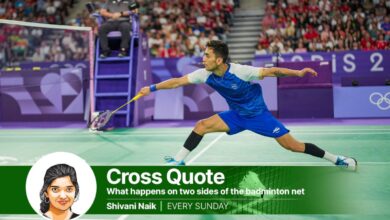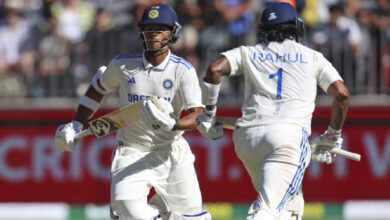Jurgen Klopp, not just a revolutionary manager but the most human of the elite managers | Football News

When Jurgen Klopp leaves Liverpool at the end of the season, the league would not only be poorer for an original revolutionary, but also the most human and democratic of managers. There is a blazing aura around his sharply-tuck black cap, an air of intellectual intimidation at times, but when he smiles, the broad, warm smile, he suddenly transforms into an uncle-next-door, chatty and amiable, obliging you a cup of coffee and bearhugs, the cloak of a world-beating manager melting.
The tracks and tees, sneakers and caps, the ruffled golden hair and careless stubble, the riot of emotions shed on the touchline, the crackling laughter and snorting, the humour and wit, all made him a common man’s manager, one even the man on the street could relate to. He had none of the heavy air or hubris of a high-class manager. He explained tactics lucidly, seldom mocked a player or manager he disliked in public, rarely talked himself up, barely kicked up a scandal, and found meaning and perspective in both success and defeat.
The success he found, alas, would forever be measured against the success of his great adversary Pep Guardiola. A league crown, Champions League title, an FA Cup and Club World Cup compares unfavorably with City’s stack in this span (a treble, five league title and a pile of less-glittering trophies). But Guardiola would pay the biggest compliment that Klopp was his biggest rival; that he would sleep more peacefully. No team has come close in challenging City as Liverpool has in the last decade. Twice, Liverpool were denied a point on the last day; the year before Liverpool were one game away from a quadruple. A goal here, a save there, Klopp could have left England with a more bulging bag of trophies.
Theirs was a rivalry like Alex Ferguson and Arsene Wenger, a season-defining, era-marking rivalry, one built on both respect and competitiveness, both aware that they would be judged on the each other. Their styles affected each other. Both Klopp and Guardiola are at once similar and dissimilar, similar in the unshakeable belief that football should be entertaining, dissimilar in how they choose their vehicle for entertainment. Guardiola is the master of order, every player functions like a piece of machine, the movements and patterns elegantly choreographed; everyone has the space to operate and not to operate. He sees football as a ballet, where roles are nuclear-specific, movements precise and fast yet languorous. Contrastingly, Klopp is the conductor of organised chaos, like lening to a rock concert. A typical Klopp move takes place at maddening pace, with an overload on flanks, and players inter-changing positions, inevitably, breathlessly.
Over the years, there has been a partial exchange of styles. Guardiola has inculcated the pressing side into his team’s game while Klopp has embraced more possession-football.
Ferguson and Guardiola won more trophies, but the legacy of Wenger and Klopp cannot be measured in the weight of the plaques they have won. Klopp’s own definition of success was “not what people think when you come in but what they think when you leave.” Klopp would leave with love and respect, having moulded the club in his image, rendered it an identity, and modernized a club trapped in past glories. He liberated the club from its past, and showed them the future. The style that he has constructed will outlast him. It shall forever be synonymous with high-intensity pressing and delightful pace.
When he took over Liverpool, the club was not only in shambles, but also teetering without direction. The new owners, the Fenway Group that bailed the club out of bankruptcy in 2010, were still wrapping their heads over the mess. From scouting to transfers, data interpretation to nutrition, they lagged behind the league’s cream. Klopp was not an expert in data or scouting, so he and the group hired those they felt could do the job. He is not an all powerful board-room autocrat, but is happy to delegate, and believes that he does not need to know everything, but just needs to hire people who do.
He gave them absolute freedom and lened to them when making transfer decisions. Like when Klopp wanted to bring the familiar face of Julian Brandt, the scouts disagreed and urged him to buy Mohammed Salah. The Egyptian would turn out to be Liverpool’s totem in the coming year. Extensive data-mining would go behind the acquisition of several players who would later be stars.
The high-pressing game he brought from Dortmund would sweep football in England, but the soul of his team was not tactics, but cohesion. The finest example came after the end of his first season, when Liverpool ended their campaign in eighth spot after a 2-2 draw with West Bromwich Albion. After the end of the game, the players, clasping each other’s arms, walked to the Kop End to thank the crowd for their support. The crowd was bemused as the practice, though common in German football, is rare in England. First, they mocked him, but such gestures helped build a bond with the players and audience. Assant manager Pepijn Lijnders would say in an interview with Dutch paper De Volksrant: “Jurgen creates a family. We always say: 30 per cent tactic, 70 per cent team-building.”
Klopp himself explained his philosophy. “All that we do in life – how I understand it – is about relationships. Otherwise, if you only want to be responsible for the things you do and not anyone else, then live in a forest alone or on a mountain alone. We all win for each other; we do it for kitchen staff, the dressing room attendants and the grass-keepers because we know how important it is for them.”
In the process of his team-building, his natural humour would come in handy. The night before the Champions League final against Real Madrid in 2018, he came to the team meeting with his shirt tucked under a Criano Ronaldo branded boxer shorts, thus defusing the pre-game tension. He would impersonate Rocky Balboa in post-match chats.
Thus, when Klopp departs, it’s not just a revolutionary manager that the league would miss but the most human of the elite managers of the words. And his legacy cannot be weighed in the weight of trophies he has won but how he changed the club and the league.







